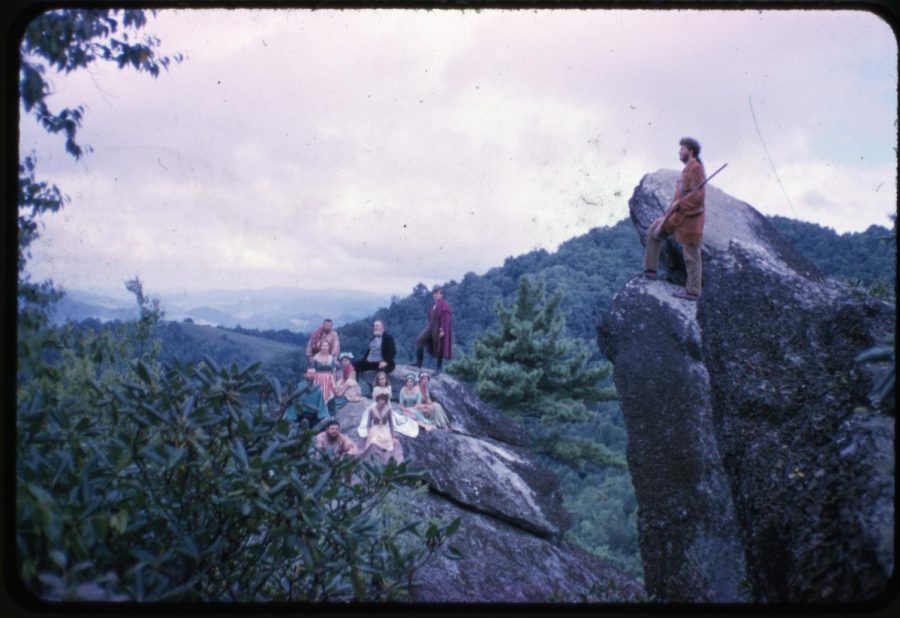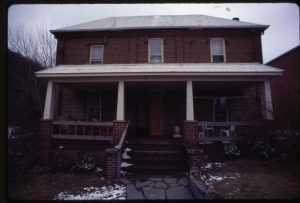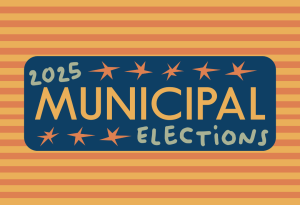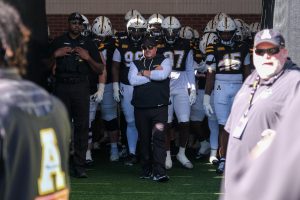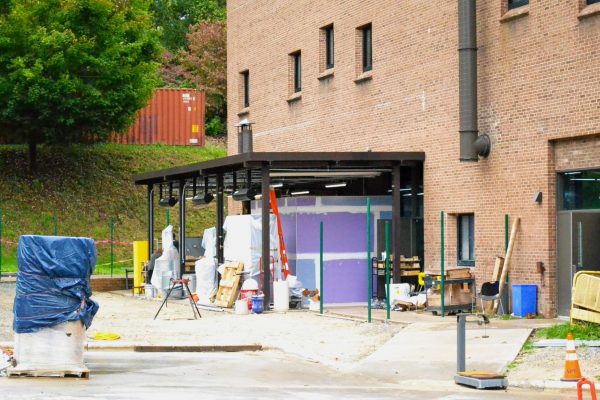Horn in the West: 70 years of success
Horn in the West cast on a boulder, with Glenn Causy overlooking the scene on the right hand boulder, circa May 1960. Photograph by George Flowers. Photo courtesy of Digital Watauga.
September 15, 2022
Located at 591 Horn in the W Drive, the nation’s longest-running Revolutionary War drama, “Horn in the West,” celebrated its 70th season this summer.
Written in 1951 by playwright Kermit Hunter and run by the Southern Appalachian Historical Association, “Horn in the West” is set in the Blue Ridge Mountains, framing the tales of famous frontiersman Daniel Boone and rural settlers against the backdrop of the Revolutionary War.
Premiering in 1952, three months after the venue construction’s completion, the outdoor drama stands as a nationally and locally frequented attraction, totaling over 1.4 million attendees since its first show, according to the Blue Ridge Heritage website.
Through the show’s 70-year history, those involved in “Horn in the West” have formed a tight-knit community of new and returning actors from across the country, including university students and faculty, alongside long-term cast members.
Taylor Osborne, a university lecturer, portrayed Judge Richard Henderson in the 70th season. Osborne, who teaches American Revolution in the Carolinas as a first-year seminar, said the educational opportunity and interest in the story are what make it special.
“The story of this show is of the people coming into this area during that time period. Nobody knows this story,” Osborne said.
Osborne said in his search for historical interpreter jobs that acting experience was required, which surprised him, but “was one of the perks of the role.”
“You’ve got to kind of have that acting experience to it,” Osborne said. “It comes off where you are not just reciting facts, but embodying that person.”
After transferring to the university in 2018 to finish his degree in public history, Osborne started as a historical interpreter at the Hickory Ridge History Museum, later joining the “Horn in the West” cast in 2021. Coming from an academic perspective, Osborne said, “making historical liberties made more sense” after performing in it.
“Before being in the show, I didn’t understand. I’m, like, ‘Oh, this stuff is all inaccurate,’” Osborne said. “Then going down there, well, no. It makes sense to do it this way. You are entertaining. Yeah, you’ve got to tell the story, but you’ve got to put your own spin on it.”
“Horn in the West’s” involvement with students and the university has been long-standing. According to a May 8, 1952 article from The Appalachian, student and alumni involvement began the year of “Horn in the West’s” premiere.
University professors such as D.J. Whitener, professor of history and executive vice president of the Southern Appalachian Historical Association, and B.B. Dougherty, a founder of the university and an advisory committee member since the Historical Association’s beginning, aided in the support and birth of the drama, according to the 1952 article.
Marrena Greer, operations manager for the Southern Appalachian Historical Association, said many cast members, including Osborne, research their characters to make their portrayal as accurate as possible. Osborne named Scott Loveless, who played Daniel Boone, as a primary example.
“When you have the historical information of a person, you know their demeanor and what they’re like, you can more accurately portray who they are,” Greer said.
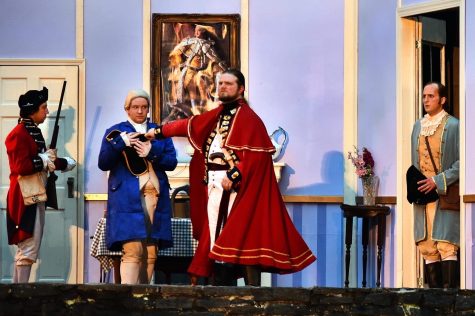
Greer joined SAHA as a bookkeeper and historical interpreter in 2019 and later became operations manager when a coworker stepped down. Greer encourages all who watch the performance to return to the Hickory Ridge Museum to learn further about the experience.
“We like to tell folks ‘go to the show and have a good time. You’re going to hear some singing and see some dancing. Have some popcorn and enjoy yourself,’” Greer said. “‘But, at some point, please visit the museum and learn the actual history of what that story is.’”
Opening as an official museum in 1980, the Hickory Ridge History Museum invites guests to view and experience the ways of early Appalachian settlement. Although the Hickory property became a museum in 1980, its origins date back to the ‘50s and have since evolved.
The first site on the Hickory property came in 1958 per donation and, following reconstruction in 1959, still stands today. The “potato cabin,” the oldest on the property, was used as “housing for the cast for a few years,” Osborne said.
In her experience with “Horn in the West,” Greer said that the organization is rooted in the families and people who make up the region’s history.
“We have a gentleman I got off the phone with the other day who was the general manager, and his son was in the play, and his wife was in the play, and his daughter-in-law was,” Greer said. “I mean, this is still a family organization. You have five, six generations of folks that have been here.”
Darrell King, a professional magician, came to the show in 1988 looking to see “if he could still hold an audience without the props.” Since then, King has been a mainstay for the “Horn in the West” cast.
“It was the community up there in Boone. It was the drive to entertain, but also it was fun,” King said. “It’s a terrific show, one that’s story is not told often enough. Just the people I got to work with kept me coming back.”
While the script has only seen major adjustments once in the late-50’s, actors and directors have added new elements that have become tradition, Osborne said. One actor, Jenny Cole, has been a part of the show for 41 years and has found ways to add her own tradition to the show.
“Jenny Cole, who plays Witha, she says a lot more lines than what it has in the show. She’s had these ad libs for decades. That’s just a guarantee you’re gonna hear,” Osborne said. “So, the history within the show, that tradition runs deep along with the actual history we are portraying.”
Tanner Funderburk, stage production manager for “Horn in the West,” joined the long-successful drama for the first time this year. Funderburk said his part as the stage manager was to serve as “the main communication between all the different departments,” including the creative department, director and cast.
Funderburk said he, too, plans on returning to “Horn in the West” next year to continue serving as stage production manager, and although the show has been running for 70 years, “there’s always a new spin to it that makes it more interesting,”
“There’s this pull from it, and when we do the show, I think the audience can see that,” Funderburk said. “I think that’s another reason why the audience members want to come back and see it again the next year.”

